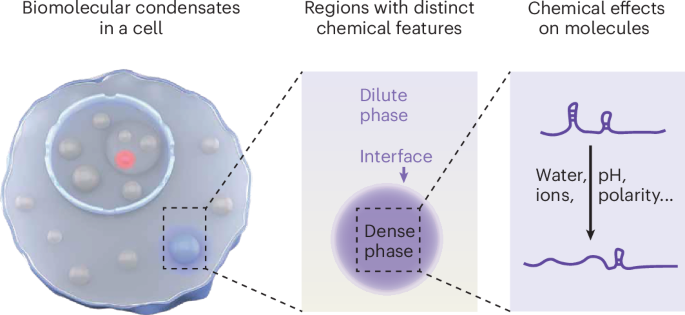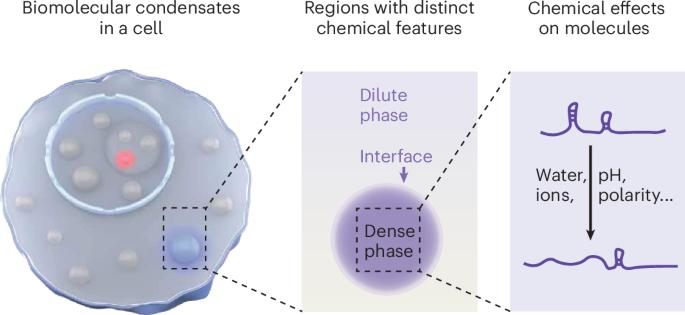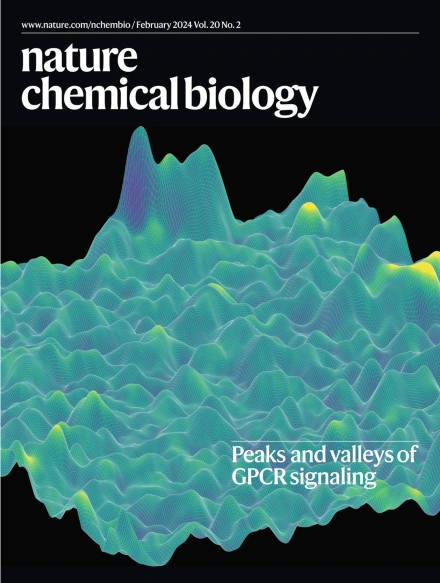开启生物分子凝聚物的电化学功能
IF 12.9
1区 生物学
Q1 BIOCHEMISTRY & MOLECULAR BIOLOGY
引用次数: 0
摘要
生物分子凝聚是以时空方式组织细胞过程的关键机制。这一过程的相变性质决定了整个溶液系统的密度变化。然而,凝结物形成所带来的物理化学特征和电化学功能在很大程度上尚未被探索。我们在此说明冷凝物的形成如何在稀相、浓相和界面区域产生不同电化学特征的基本原理。我们讨论了这些不同的化学和电化学环境如何通过水、离子和电场的影响来调节生物分子功能的原理。我们描述了通过冷凝物的形成调节化学和电化学环境对细胞行为的潜在影响。本视角旨在作为一个总体路线图,将凝聚态概念化为电化学活性实体,并从物理化学方面评估其功能。本文章由计算机程序翻译,如有差异,请以英文原文为准。


Unlocking the electrochemical functions of biomolecular condensates
Biomolecular condensation is a key mechanism for organizing cellular processes in a spatiotemporal manner. The phase-transition nature of this process defines a density transition of the whole solution system. However, the physicochemical features and the electrochemical functions brought about by condensate formation are largely unexplored. We here illustrate the fundamental principles of how the formation of condensates generates distinct electrochemical features in the dilute phase, the dense phase and the interfacial region. We discuss the principles by which these distinct chemical and electrochemical environments can modulate biomolecular functions through the effects brought about by water, ions and electric fields. We delineate the potential impacts on cellular behaviors due to the modulation of chemical and electrochemical environments through condensate formation. This Perspective is intended to serve as a general road map to conceptualize condensates as electrochemically active entities and to assess their functions from a physical chemistry aspect. This Perspective discusses how macromolecular condensation can regulate the electrochemistry to affect biological function in living cells and provides a framework to study the electrochemical functions of biomolecular condensates.
求助全文
通过发布文献求助,成功后即可免费获取论文全文。
去求助
来源期刊

Nature chemical biology
生物-生化与分子生物学
CiteScore
23.90
自引率
1.40%
发文量
238
审稿时长
12 months
期刊介绍:
Nature Chemical Biology stands as an esteemed international monthly journal, offering a prominent platform for the chemical biology community to showcase top-tier original research and commentary. Operating at the crossroads of chemistry, biology, and related disciplines, chemical biology utilizes scientific ideas and approaches to comprehend and manipulate biological systems with molecular precision.
The journal embraces contributions from the growing community of chemical biologists, encompassing insights from chemists applying principles and tools to biological inquiries and biologists striving to comprehend and control molecular-level biological processes. We prioritize studies unveiling significant conceptual or practical advancements in areas where chemistry and biology intersect, emphasizing basic research, especially those reporting novel chemical or biological tools and offering profound molecular-level insights into underlying biological mechanisms.
Nature Chemical Biology also welcomes manuscripts describing applied molecular studies at the chemistry-biology interface due to the broad utility of chemical biology approaches in manipulating or engineering biological systems. Irrespective of scientific focus, we actively seek submissions that creatively blend chemistry and biology, particularly those providing substantial conceptual or methodological breakthroughs with the potential to open innovative research avenues. The journal maintains a robust and impartial review process, emphasizing thorough chemical and biological characterization.
 求助内容:
求助内容: 应助结果提醒方式:
应助结果提醒方式:


